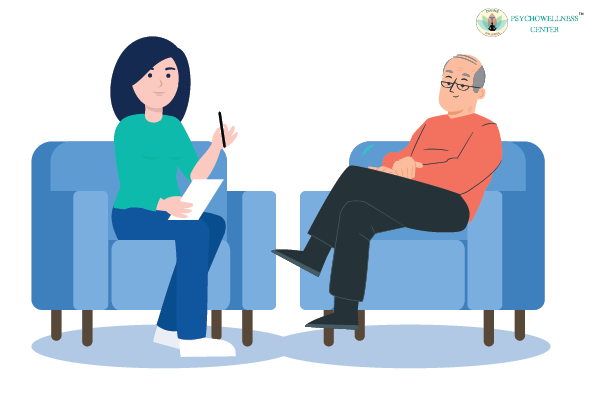The prevalence of emotional and psychiatric problems like depression among elderly individuals will rise along with rising life expectancies in developed nations. Thankfully, there are a variety of efficient therapy techniques and exercises designed to increase elderly people’s adaptability and tolerance. For some individuals and their families, the aging process can be challenging. While many older persons excitedly wait entering their latter years, others can find it challenging to adjust. As they approach and past middle age, all adults may face health problems and stress, and the help of a therapist or other mental health expert may smooth the transition.
Aging process, often known as old age, is the last stage of life and can be the most gratifying. It is a stage in life where most aspects of a person’s social life are influenced by the interaction between the physiological consequences of ageing and the shared experiences and ideals of a generation that are unique to the social order in which it lives. Even though they are sometimes considered to be an adult’s “Golden Years,” the older population faces a number of difficulties.
It is important to increase awareness of this topic because ageing and mental health issues create a double disadvantage. Among the most observable characteristics of the older people as they enter the past middle age are health difficulties and stress. The negative consequences of this shift might be reduced by the help of a therapist or other mental health specialist.
Challenges faced by elderly people
While some adults may joyfully look forward to retirement, grandkids, or just a new stage of life as they enter their “Golden Years,” others may fear the negative impacts of ageing on their health and minds. If they do encounter physical difficulties that limit their movement, it could be challenging for some adults to make the adjustment to retirement, deal with new weakness or medical conditions, or find pleasurable, fulfilling hobbies. Some older persons may find it difficult to accept their death, especially when colleagues, peers, wives, or partners pass away. As a result, they may sense isolation after a number of such deaths. Alzheimer’s disease or other forms of dementia, which affect older people, may make it difficult for them to take care of fundamental necessities.
Medical issues of aging
Differentiating between age-related effects that are normal and physical or mental illness symptoms can be difficult for elderly people. Many elderly people lead happy, healthy, and independent lives to this day. The majority of older persons will have some cognitive changes, although this is a typical element of ageing. Studies have discovered that healthy elderly people frequently experience minor decline in the following areas:
-
Both verbal and visual memory
-
Visual-spatial skills
-
Quick recall, or the capacity to name items
-
Auditory and visual
-
Physical stamina, hunger, and level of energy
Cognitive and mental health concerns
Older persons experience mild mental decline as they age, but some may develop dementia, which can cause serious functional impairment and may have an impact on the development of diseases including depression, paranoia, and anxiety. Older persons frequently face the following mental health issues:
-
Sleep issues and dysfunctional sexuality
-
Depression
-
Concerns with behaviour include hostility, excessive movement or restlessness, and verbal outbursts. They are frequently brought on by dementia, sadness, or delirium.
-
High rates of suicide. Senior citizens have the greatest suicide rate of any age group.
-
Dependency on substances and alcohol, search for the Best psychologist delhi or get advice from the Best clinical psychologist.
Therapy intervention
Interpersonal therapy
In this short-term, structured therapeutic method, the Best psychologist in India and client cooperate to identify the client’s underlying issues and create workable coping mechanisms. The following three phases include the application of interpersonal therapy, which has been proven to be successful in treating depression.
-
Analysis of the client’s problems and how they influence them
-
Identification of healthy coping mechanisms and ongoing evaluation of their effectiveness while undergoing therapy
-
Summing up the positive effects of the client’s new coping mechanisms and preparing the client to keep using them after treatment
Cognitive behavioural therapy
The foundation of Cognitive behavioural therapy (CBT) is the idea that cognitive variables maintain emotional problems and that psychological treatment leads to changes in these factors using cognitive and behavioural strategies
This method takes into account both behavioural and cognitive factors that can affect a person’s emotions in a specific circumstance. According to Bartels et al. (2004), CBT is a successful treatment for depression in older adults.
Exercise training
For aged people, maintaining physical activity is important because it promotes longevity, physical health, and mental wellness. The prevention of injuries also requires exercise training. Hauer et al. (2001) investigated the effects of a three-month exercise programme for older individuals with a history of falls on participants’ strength, mobility, and balance. Exercise was associated with improved functional motor performance, strength, and balance, and these effects persisted at a three-month follow-up, according to the findings (Hauer et al., 2001).
A great option for elderly adults to connect with others going through similar challenges is through geriatric group therapy. Social isolation may also be reduced with the help of group therapy. According to the limited evidence, Group therapy may be an effective treatment for elderly adults who are depressed. Seek help from the Counseling psychologist or Online counseling.
Schedule a mental health treatment session with the highly skilled and experienced psychologists at the Psychowellness Centre. The building is near Janakpuri, Dwarka, Faridabad, NOIDA, and Delhi NCR.
Contribution: Dr (Prof) R K Suri, Clinical Psychologist, life coach & mentor TalktoAngel & Ms. Sakshi Kochhar, psychologists.

